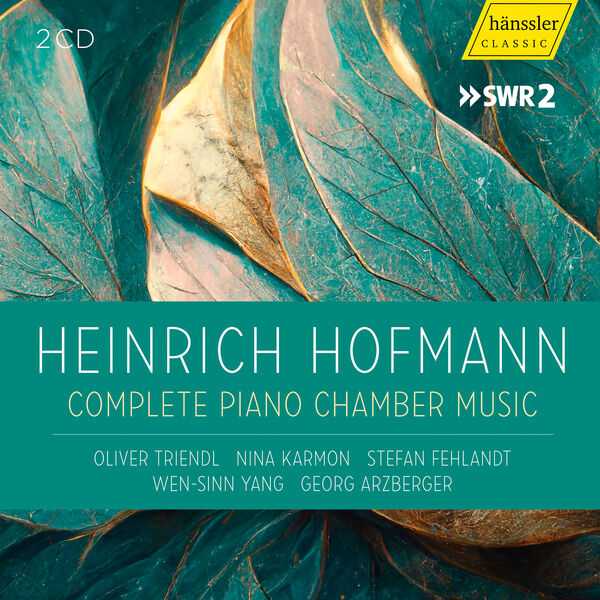

Composer: Heinrich Hofmann
Performer: Oliver Triendl, Nina Karmon, Stefa Fehlandt, Wen-Sinn Yang, Georg Arzberger
Format: FLAC (tracks)
Label: Hänssler
Catalogue: HC22014
Release: 2023
Size: 1.21 GB
Recovery: +3%
Scan: yes
Piano Quartet D minor op. 50 in D Minor
01. Vivace, ma non troppo
02. Andante poco sostenuto
03. Vivace
04. Animato
Violin Sonata F minor op. 67 in F Minor
05. Allegro molto
06. Romanze. Andante.
07. Allegro molto
08. Romance for cello and piano op. 48
Piano Trio A major op. 18 in A Major
09. Allegro animato
10. Andante con moto
11. Vivace assai
12. Allegro con fuoco
13. Adagio F major for violin and piano op. 31a
Three Prairie Pictures for violin and piano op. 39
14. Vivace
15. Russische Romanze. Non troppo lento
16. Trepak. Vivace
Serenade for cello and piano op. 63
17. Marsch. Allegro non troppo
18. Lied. Moderato
19. Reigen. Allegro
20. Abendgesang. Andante
21. Gavotte. Allegro
22. Andante for clarinet and piano op. 98
“Heinrich Hofmann (1842-1902) had an unspectacular life, but enjoyed some spectacular successes. He rose to fame in 1869 at the age of 27 with his Parisian crime caper Cartouche; Jacques Offenbach’s one-act plays were very popular in Berlin at the time. From then on, Hofmann no Ionger had to give piano Iessons, but was able to live off the proceeds of his compositions. With his programmatic symphony Frithjof (based on a Nordic saga), the heroic opera Armin, (which ends with the victory of the Cherusci in the Teutoburg Forest), and the ingenuous musical comedy Annchen von Tharau, (in which a young theology student cadges the folk song Annchen from the elderly lyricist Simon Dach), he created works which were frequently performed in his time, reflecting the zeitgeist of the years 1870 to 1890 following the founding of the German Empire. But even his honourable acceptance into the Berlin Academy of Arts could not prevent his works from being performed less frequently from the 1890’s on. After his death, his music felI largely into obscurity.”